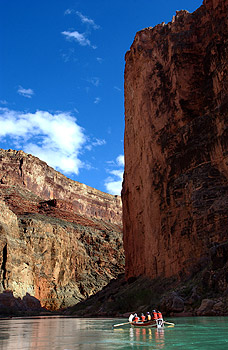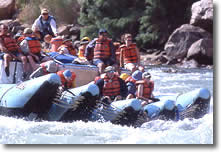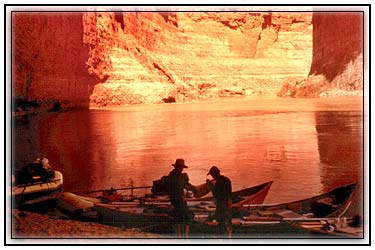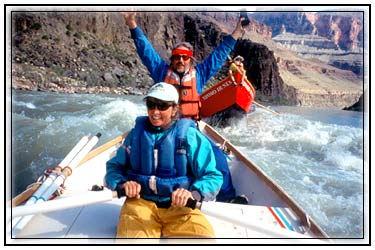Wild Land or Disneyland?
As though do-it-yourself river access weren't already limited at Grand
Canyon National Park, Park Service officials have announced a "freeze"
on accepting applications for river permits for those who don't want
a large-sized, commercialized experience on one of the world's most
sought-after wilderness rivers.
"The Grand Canyon is open for business, but not for the public
to use," says Kim Crumbo, the Wilderness Coalition's Grand Canyon
Regional Director and a former river runner and wilderness manager with
Grand Canyon National Park. "This freeze on self-guided permits
might as well be the Park saying that a theme-park experience on the
Colorado--not its unique wilderness qualities--is all that matters."
The National Park Service (NPS) freeze applies only to those seeking
a permit to run the river on self guided and mostly oar-powered trips,
while commercial outfitters, who already hold a tight 70% of access to the
river, are allowed to continue selling seats for their large motor trips.
The current system of permitting has resulted in 20+ year waits for
people seeking an authentic wilderness river experience.
commercial outfitters, who already hold a tight 70% of access to the
river, are allowed to continue selling seats for their large motor trips.
The current system of permitting has resulted in 20+ year waits for
people seeking an authentic wilderness river experience.
Grand Canyon National Park is currently engaged in a planning process
that will determine how recreational access for the Colorado River will
be managed. Due in part to the tremendous popularity of the Grand Canyon
itself and the unique opportunity to marvel at the hush and the rush
of this wilderness river, the park has received more than 50,000 comments
from the public. The Park Service has admitted that a high percentage
of the comments indicate that the current allocation system is unfair,
broken, and needs to be fixed.
"The Park Service's decision to stop taking applications for self
guided trips while allowing commercial boaters to still sell seats is
a baffling response to an already unfair system for allocating access
to the river," says Donald Hoffman, Executive Director for the
Arizona Wilderness Coalition. "It has become clear to everyone
that the Park Service must overhaul the allocation system to allow more
self guided trips. Placing a freeze on applications for self guided
trips only adds insult to injury."
The Arizona Wilderness Coalition has developed an
alternative for the Park that would split river access in half, giving
private river runners a more equitable share of river running while
also better preserving a quiet, more secluded wilderness experience
for everyone. The Coalition's proposal would retain the permits
already allocated to commercial outfitters and, at the same time, expand
access opportunities for self-guided boaters by extending the river
season in spring and fall. Read the resolution here.

Grand Canyon dories. Photos by Michael Powers.
The Coalition has presented its resolution to the Park Service to be
considered in the Colorado River Management Planning process. Several
other conservation groups have also provided alternative systems for
allocating river use that provide greater balanced access while protecting
the wilderness qualities of the river. In past comment periods, public feedback to the Park regarding its current
permitting system overwhelmingly called for a renovation of the ridiculously
long wait for non-commercial runners. There are currently about 130,000
people waiting to go down the Colorado River
in a private boat,
and more than 1,000 more are typically added each year. Occasionally
those waiting for a private boating experience die before their permit
is called.
In past comment periods, public feedback to the Park regarding its current
permitting system overwhelmingly called for a renovation of the ridiculously
long wait for non-commercial runners. There are currently about 130,000
people waiting to go down the Colorado River
in a private boat,
and more than 1,000 more are typically added each year. Occasionally
those waiting for a private boating experience die before their permit
is called.
“So why add fuel to that fire?" says Jo Johnson, co-director for the
Boulder-based group River Runners for Wilderness, who is quick to point
out: "We want the Park to be thinking about changing the access
and allocation method to one that reflects real public demand and shows
no favoritism."
>Johnson brings up another point: "Freezing the waiting list removes an
indicator of public demand for river trips, the only indicator the Park
Service has. Now the park has no way of measuring demand at all. Vigorous
advertising by commercial operators to fill trips and lack of demand
for those same trips---many of which have gone unfilled the last few
years---indicates an oversupply in their allocation. This is in huge
contrast to the multi-year wait those 130,000 paddlers face.”
“This freeze tells a larger story, and quite a truthful one, about how the
Bush Administration views our public land treasures,” says Rob Smith,
Southwest Representative for the Sierra Club. “They throw open
Yellowstone to motorized winter use, without regard for the non-motorized
experience and wilderness character of that park. They act to prevent
any future wilderness on BLM lands. They threaten new roads across
Western public lands by turning over ancient rights of way to counties.
Freezing river access at Grand Canyon is par for the course.”
The Park Service is scheduled to wrap up the CRMP in December 2004,
pending no interference from the commercial boater industry. Commercial
boaters have been lobbying to side-step the public planning process
through a "legislative fix" that would guarantee their continued
control of one of the finest wild river canyons left in the world.
|

